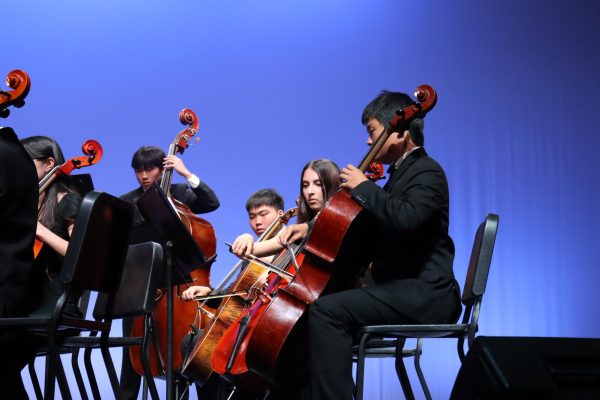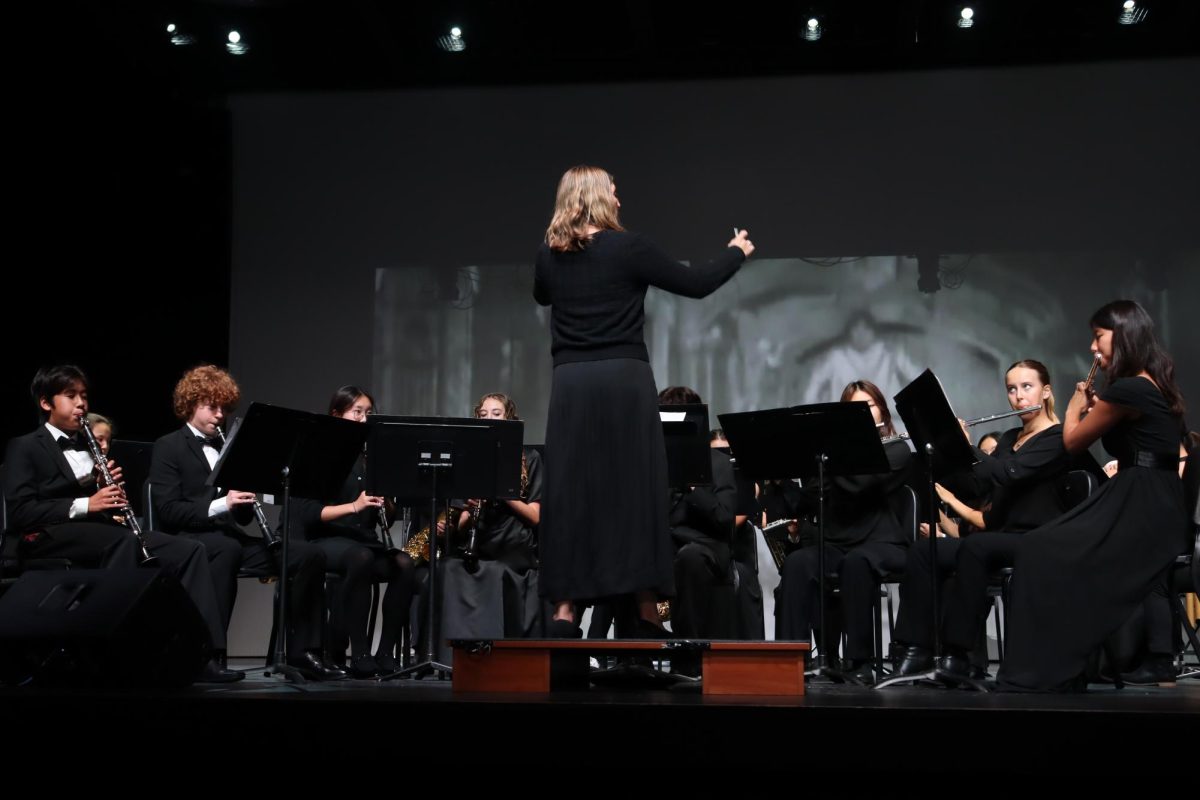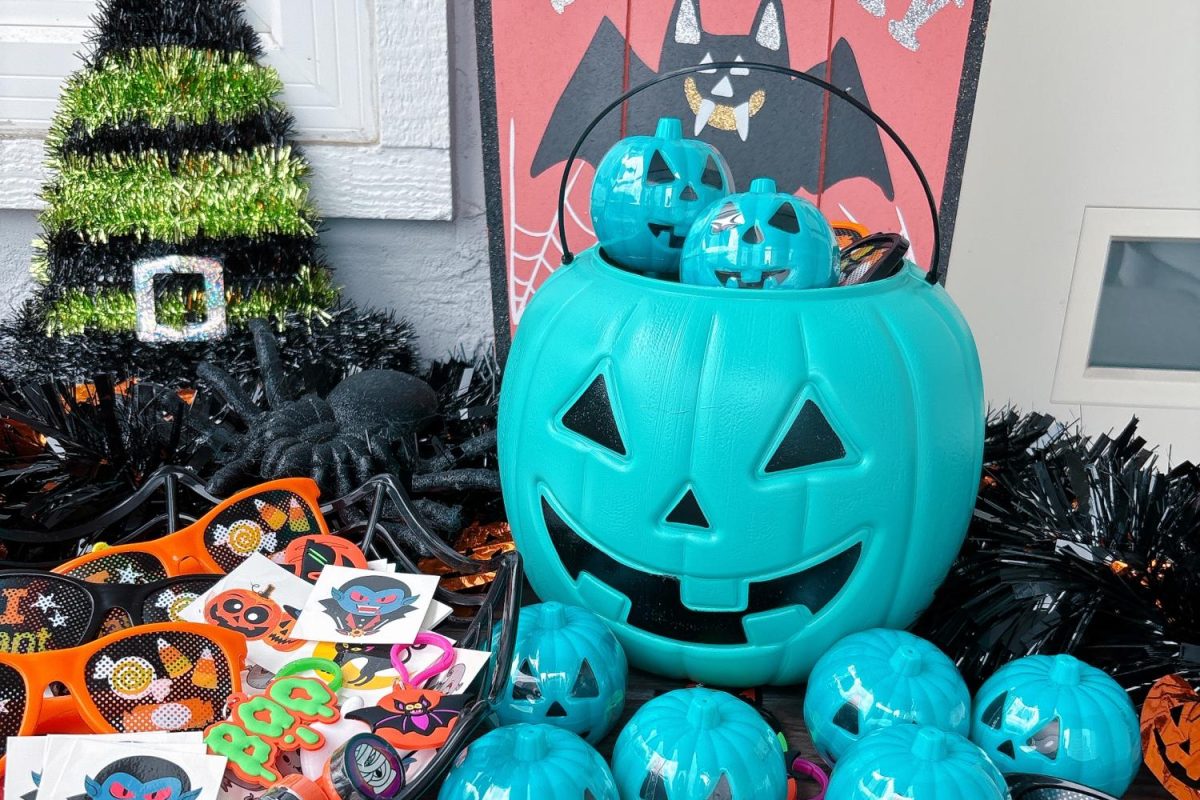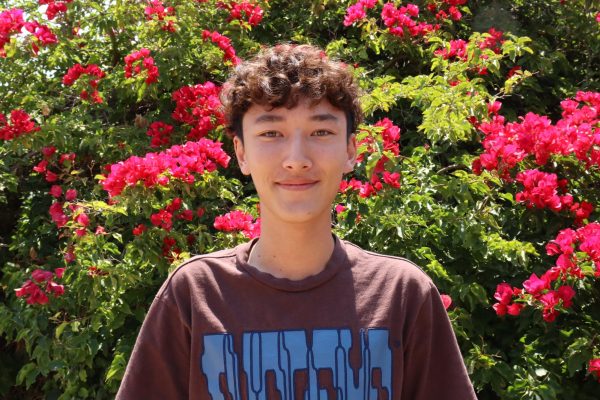Four hours after instructions ended, the whole school sits in silence — except for the Performing Arts Center. Up on stage, student musicians, dressed in black, are busy rehearsing. Doors open, and the audience waits for the clock to strike 7; A rhythmic tune of Karl King’s “Big Four March” breaks the silence — the annual Fall Concert began.
The concert consisted of three pieces by band, four by the orchestra, and seven by the jazz band. Students rehearsed the pieces since the start of the school year in preparation for their first concert of the year.

“Our instructor, Ms. Gelb, generally gives us a whole lot of pieces that we sight-read, which is basically playing without hearing it or knowing anything about the piece,” Abel Ducom (12), who plays the trumpet in jazz band, said. “Every year, since we have new people coming in and the seniors leaving … we kind of have to figure out where the jazz band is in terms of sound, so she gives us a whole different set of pieces that have different types of sound so that we can figure out what we’re best at.”
The concert centered around a fall theme, though the pieces performed resembled a variety of themes.
“I have a couple of pieces that are kind of fall-ish … [jazz band is] doing a very famous tune called Autumn Leaves, and one of our vocalists is singing a little fall theme in there,” Gelb said.
Within the pieces, the concert also included solos by different students.
“For the most part, not everyone has a solo, but we’re really trying to get everyone to be a part of it,” Ducom said. “And because jazz is really such an open thing and it’s about the expression of thought, and really what you’re playing is not written on the page, it’s completely improvised.”
Jazz band performances also included vocals by Lindy Crosby (11), Gioia Nowers (9) and Raisa Tuerxun (12).

Each concert brings a different ensemble, as each music group adjusts to cohesively combine the skill levels and playing styles of new members with those of returning members.
“I think there is a little bit of adjustment, especially initially as a section leader, you have to learn the capabilities of your section and exactly what will need work during sectional,” Mila Keres, section leader of second violin in the orchestra, said. “In some years it’s different than others.”
While practices have been happening for over seven weeks, individual efforts outside of the classroom are necessary to bring the pieces together.
“We have to make sure to practice at home and come to the rehearsals to kind of mash things together and mend everything,” Jenny Ryu (11), who plays the violin in jazz band, said.
As the concert neared, the music classes became more focused, ensuring they were fully prepared for the performance. However, they still maintained a fun environment.
“We try to keep it fun, but when it comes down to the weeks before the concert, it’s really time to focus in,” Ducom said. “And I mean, everyone practices independently. So it’s really kind of a group, collective effort. And if we get something done, or if we have time, obviously the group dynamic is really close, because we’ve been in [the jazz band] for a while now.”
The classes have different customs before and after each concert.
“Before [or after] concerts, we usually try to get something to eat,” Ducom said.
Like other teams on campus on game days, the music department also has team T-shirts to heighten spirits for the performance.
“They all have music department T-shirts, so I try to get them to wear them the day of the concert, just to get pumped up,” Gelb said. “Then, [there are the] last two or three rehearsals before the concert. We always rehearse in the PAC so we get used to the acoustics and start kind of training ourselves what it’s going to be like.”
For returning students like Ducom, the concerts are not as nerve-racking as they used to be.
“I’m pretty used to it at this point,” Ducom said. “I mean, the nerves are still there, like you’re still performing in front of people, and it’s just instinctual that those really won’t go away. But I think getting used to the structure and how it moves and how to prepare yourself before the concert, not to overexert yourself, is really important.”
Keres shared a similar sentiment.
“At this point, I’m excited now, especially with a new group of people,” Keres said. “After the first concert, you just feel so much more together.”
For first-year students, however, there is less assurance as they face an entirely new experience, whether that be concert attire or performing in front of a crowd for the first time since entering high school.
“I would say the returning students are used to it, because we have between like, four and five concerts a year,” Gelb said. “But the freshmen are always a little bit nervous. [In a] new school, they don’t know what to expect … and the whole setting is very different. So I think they get nervous, but usually by the second concert in January, everyone’s pretty used to it.”
Regardless of how many times one has performed at a concert, the feeling of excitement never fades.
“When you’re on stage and you’re in the music, time just goes by really fast,” Keres said. “You don’t have like, a sense of ‘okay, we have like 30 minutes left to this.’ It’s just like you’re in the moment.”
Ducom agreed that when up on stage, he is immersed in the music.
“I’d say my favorite part is there’s kind of like a mode where everyone has just switched on,” Ducom said. “And it happens a lot during concerts, where you’re just entrenched in the music.”
After delivering music, the student musicians were met with a loud round of applause.
“I thought everything went really well,” jazz band’s baritone saxophone player Cooper Yoo (12) said. “I think all three groups sounded really strong last night and it’s always good to start the year off strong.”
Gelb, who has directed the school’s music program since 2004 , shared the most fulfilling part of the concerts.
“I guess [my favorite part of the concerts is] just seeing all the hard work pay off … There’s a long process to get there, and it’s just really fun to see the improvement over the seven weeks that we [practiced],” Gelb said.










